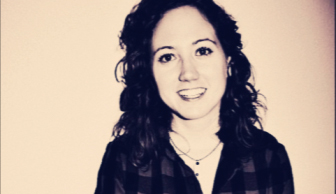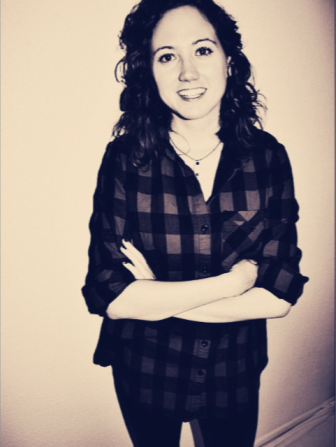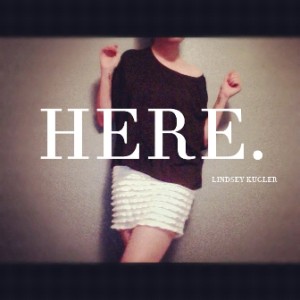Lindsey Kugler was born and raised in Tucson, Arizona, and currently lives in Portland, Oregon. She loves gel manicures, doodling, and does not own a bicycle. Here is a memoir of intimate vignettes and pictures about a year of professional and personal service. Lindsey wrote and produced Here as a student in the IPRC’s Certificate Program in Independent Publishing.
What made you apply to the IPRC Certificate Program?
For maybe the last four or five years I just considered myself a girlfriend. I was in a series of codependent relationships where I gave up everything I wanted to do creatively and was part of an entity. I recently broke up with my significant other, I didn’t have any money, and I couldn’t find a job. My second AmeriCorps position had just ended, so I couldn’t do AmeriCorps again. I was living out of my car for a few days before bouncing around to Vancouver and King City. I had no direction, and I didn’t really know who I was after all of this.
I had seen the IPRC’s website before, but I didn’t know what they did. I saw they offered a certificate program in writing and I thought, “I like writing. I used to do that. I used to like it a lot.”
The deadline to apply had been extended. I had like one day to apply, so I did it. I drove out of King City, found a mailbox, sent in my application, and then they were like, “Yeah you’re accepted; come do this.” I didn’t really expect it to happen.
I was excited because I was doing something for myself that would rekindle what I loved. I wasn’t sure if it was going to be great or not. I didn’t know about the program at all. I thought, “I’m just going to go do this and see what happens.” So I found a place to live, found a job, and started doing the program.
What attracted you to the program?
I was lost, as cliché as it is. I didn’t have any sense of what I liked doing, apart from my partners and my jobs. I had kind of just become everybody else. I had to rebuild and it seemed like a really good program where I could do that.
I remember from watching the promotional video explaining the certificate program that everybody seemed really friendly and unique, so I could tell that creativity was accepted and welcomed. Nobody was uniform. People were doing what they wanted and that excited me.
Your class was a mixture of fiction and nonfiction writers. How was that for you?
It was fun. I always considered myself a fiction writer until I started the class and wrote my first nonfiction essay that eventually became the book. I think fiction is harder for me now.
Were you given assignments each week?
Usually we would get some readings, then in class we’d get an assignment based on the readings, doing something similar. So we would do that, then submit a piece and workshop it.
Did you write in class or just outside of class?
We did both, which was neat. It was fun to communally write. I liked to peek around and watch what people were doing. Some people write really hurriedly and some people, like me, don’t have a whole lot to say right away.
How was the workshopping process?
My only workshop experience was in college with really bored TAs who didn’t care about helping us undergrads figure out if we wanted to be writers or even helping us with our skills. My peers were generally a bunch of kids who didn’t know what they were doing or who didn’t care, students who were there just for an English credit.
So I was really nervous that the IPRC workshop would be similar, but it was serious business when we sat down. And the process was different too – the writer had to be in a box. If your piece is being workshopped you’re not allowed to say anything until you’re out of the box, then you can ask questions. So that was weird for me because I was used to people interrupting while you give feedback. This time you had to keep your mouth shut.
What I really liked was that all of the students were supportive and knew what they were talking about. People were interested in everybody else’s projects even if they didn’t agree with it. There were some projects where we were like, “I have no idea what you’re trying to do, but I like it.” We were all open enough to know that we might just be missing something and we’d discuss what the writer was trying to do. That was helpful because if we were trying something and it went over everyone’s heads, then we knew we had to find a better way to communicate it.
I like the workshop method you use. I think of it as a kinder, gentler workshopping experience.
It was. I think especially for the situation I was in, if it had been similar to the workshop experience I’d had before I wouldn’t have been able to continue with the program.
That’s what was was so special about my experience. Our instructor, Justin Hocking, was so gentle and so open. He was always available and really honed in on what my fears were really about. I met with him and said, “I’m freaking out about X, Y, and Z” and let him know a little bit about where I was coming from. It wasn’t like I was trying to find a free therapist or get something off my chest, but all of this was blocking my creativity and my ability to express myself openly. Now that I was given free reign, I realized I had no idea how to do this.
I don’t think there are very many people who are presented with something like that and can still be like, “I can help you.”
How did Here come about?
It started out as an assignment for workshop to write a braided or lyrical essay. I really think now, looking back at it, it was a way for me to process all of what had happened with my year in Austin, Texas, and doing AmeriCorps. I had a roommate who I felt really connected to but who was going through her own stuff. It was a way for me to process that entire connection.
I was really worried about it. I wrote about things I did, and before, I’d talked to only close friends about these experiences and connections. I even wrote about stuff I didn’t talk to anyone about.
The great thing was that everybody in class was so excited about the essay and they asked me to expand it. They gave me a lot of great feedback and I left that initial workshop feeling so exhilarated. They had read this stuff about me and were encouraging me to vocalize it. The next few months I just hammered out more and it eventually became a 140-something-page book.
I attribute being able to write this to the openness of the workshop and really Portland, in general. I was able to say, Yeah I did this. And I want to talk about it in a critical way, analyze it, and think about it, instead of it being this weird anomaly.
When did you decide to use photos?
They were all photos I already had except for a couple that were taken later. It’s not like I think they’re beautiful or artistic, but I liked them, and I think they worked really well with the story. I thought it would be interesting to add a visual component, but I was worried because of the nature of the content that it would be more of a gimmicky or cliché thing. I worried about being exposed physically and having people take my writing less seriously.
But then I figured why not? I can always take them out. People ended up really liking the photos and thought they added to the book so I kept them in.
Now that you’re done with the program and you’re working, do you feel like you’re able to keep up with your writing practice?
I was working, babysitting, and taking a few other classes during the program, so it’s not just that I was busy. For me structure is always a motivator. Having deadlines and having people expect work from me really pushes me. I’ve always been a slacker kid in school, working right up until the last second, so when I don’t have a last second to work up to I think, “Oh I’ll just work on that project later.” So that’s something I have to learn. I don’t think a structured program can teach me how to be disciplined without a structured program. I might need a life coach for that.
I started developing a system when I was in the program of writing really late at night because that was really the only time I was by myself and I didn’t have to worry about anybody talking to me or bugging me, so I could just get it out. I can’t do that now because I need the sleep or I wouldn’t be able to function with all of my many jobs. It’s hard for me to find time to write now. Usually it’s in the evenings. I’m working on a lot of new projects and ideas, but I’m still so busy. So I wonder how people do that. You really have to carve out time. You really have to make it as much of a priority as your jobs.
I’ve been trying to do that for about 20 years.
I know. It’s like a lifetime thing.
Are you looking for a publisher?
I’ve had some interest that I’m pursuing, but I don’t have an agent so this is all new to me. I’m working through all of that now. It’s very slow, because I want to do it right. Justin, Michael D’Alessandro, and A.M. O’Malley have been really helpful with all of this, too.
What would you tell people about the program?
I know there were a lot of people who came in hyperfocused on the writing portion of the program but they weren’t as interested in the production portion. I am maybe the fumbling antithesis of the cool, crafty, DIY culture that makes Portland as lovely as it is. So the production part of the program was exciting. I learned new things about my hands, my love for design, and my ability to pull levers and push buttons that I have never really gotten to experience before. I made all the copies of my book by hand at the IPRC.
I also met so many people I wouldn’t have met if I hadn’t been hanging out at the IPRC messing around on a machine and seeing people working on their projects.
Everyone there is working on really interesting, cool stuff that they care about – stuff I feel like I’m not seeing everywhere. And you get connected with people in a way you wouldn’t anywhere else, unless you’re heavily connected to the zine scene or the lit scene. That’s the exciting part, all of the connections you’ll make.
Lindsey was interviewed by Amy Souza, a student in the IPRC’s Comics Certificate Program.



